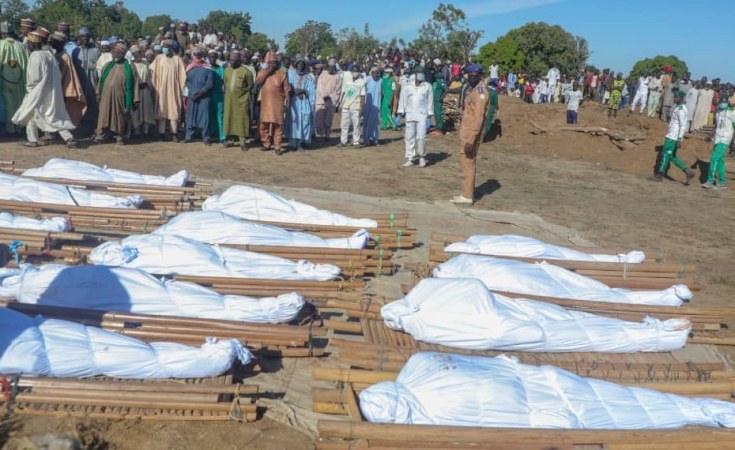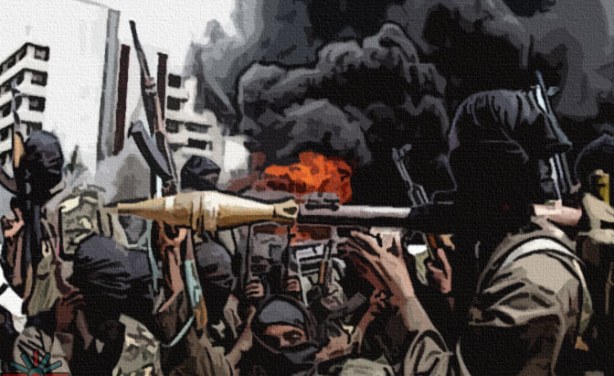 Hundreds of residents mourned as they gathered to bury corpses of 43 farmers slaughtered in Zabarmari village, a rice-producing community located in Borno State
Hundreds of residents mourned as they gathered to bury corpses of 43 farmers slaughtered in Zabarmari village, a rice-producing community located in Borno State
It was a sad day in Zabarmari village as hundreds of residents in the rice-producing community located in Jere Local Government Area of Borno State gathered to bury the 43 corpses of farmers that were slaughtered the previous day.
Armed men, suspected to be members of the terrorist group, Boko Haram, attacked farmers in what appeared to be a reprisal for the latter’s effrontery to disarm and arrest a gunman.
PREMIUM TIMES Saturday reported that at least 40 rice farmers were beheaded while working in their farms.
Borno State governor, Babagana Zulum, led other top members of his government to attend the burial that took place in Zabarmari.
Mourners heaved 43 corpses into nine mass graves, with each one containing an average five corpses of the slain farmers, after an Islamic funeral attended by many tearful mourners.
All the apparels used in covering the corpses were drenched with blood from the necks, a sign that they had their throats slit.
The governor of Borno State later addressed the residents of the community who gathered in front of the village head’s palace, where he consoled them over the sad incident.
“We are here to sympathise with the people of Zabarmari over this sad occurrence,” he said.
“It is disheartening that more than 40 citizens were slaughtered while they were working in their farmlands. Our people are in very difficult situations, they are in two different extreme conditions. On one hand. they stay at home, they may be killed by hunger and starvation, on the other, they go out to their farmlands and risk getting killed by the insurgents. This is very sad.
“We are still appealing to the federal government to ensure recruitment of more of our youth in the CJTF and hunters into the Nigerian military and the Civil Defence so that they can form part of the agro rangers that will protect farmers. We need many boots to protect farmlands and our youths understand the terrain. We will not lose hope because we have to remain optimistic about ending the insurgency,” Mr Zulum said.
How our kinsmen were killed
Usman Ismail, a 25 years old man, was one of the few farmers that escaped the killings by the insurgents.
He said the assailants surrounded them as they were working their farms in Garin-Kwashebe village.
“Some of them walked up to us and asked that we follow them to a far end of the rice field,” he said.
“We were scared because we knew they were Boko Haram who usually come to harass us for money and food. But as we got to the edge of the field, we spotted one man at a distance slitting the throat of someone. We panicked and began to run. I was lucky to escape but others could not.”
Hamidu Bala, another resident of Zabarmari, who is also a member of Rapid Response Squad, a Borno government-established task force against banditry, gave an insight into how the 43 farmers were killed.
He said on Friday, a group of farmers were able to disarm a lone Boko Haram member, who they handed over to the local security operatives.
“That action was what may have prompted reprisal from the insurgents,” he said.
“Saturday was election day and many of the security operatives working around the rice farms were around the polling areas and no one was expected to be in the fields harvesting rice,” he said.
“According to one of the farmers who miraculously escaped being slaughtered, the insurgents arrested them and took them to a house at the outskirts of Garin-Kwashebe. After some hours, the insurgents began to pick them out one by one, with the pretext to interrogate if they had a hand in the arrest of their colleague.
“Unknown to them, each person that was taken out of the house was summarily slaughtered like an animal. It took some time before some of them managed to sense that their colleagues were being killed.”
He said over 60 farmers were taken into the said house, “but we are yet account for the rest of them. We don’t know what happened to them; we don’t know if they had changed the location because we could only recover 43 corpses, while the remaining ones are yet to be accounted for.”
Zabarmari, a farming community located about 25km from Maiduguri, is the heartland of rice production in Borno State. Most of the residents of the area are Hausa migrants from North-west Nigeria.
The community had suffered similar attacks, both in the township and in the rice fields, in the past
The Boko Haram insurgency has claimed well over 30,000 lives and displaced about three million people mostly in Borno State and North-east Nigeria.
Read the original article on Premium Times.
